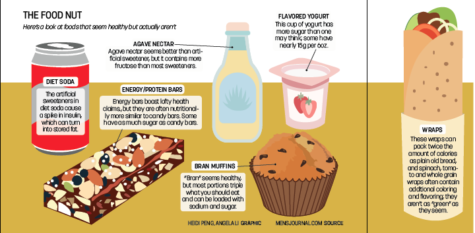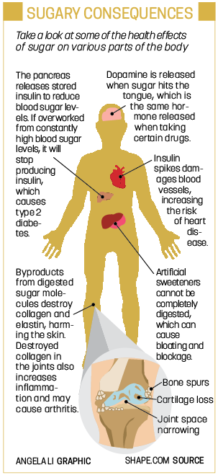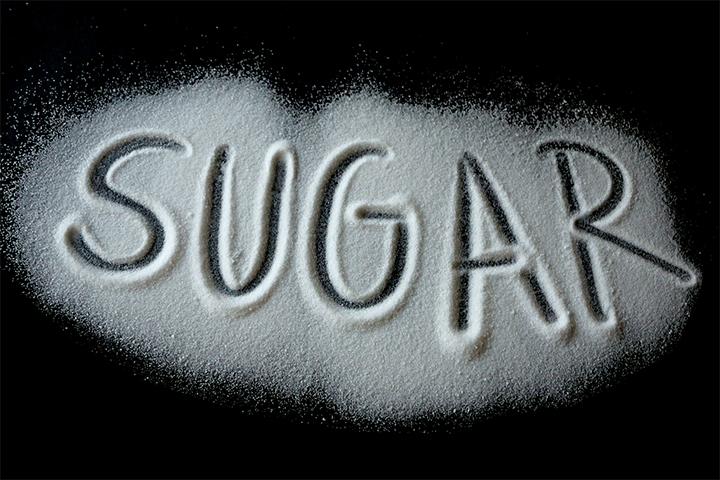Your donation will support the student journalists of Carmel High School - IN. Your contribution will allow us to purchase equipment and cover our annual website hosting costs.
Sugar Struggles: CHS students, teachers discuss health effects of sugar in the American diet
August 14, 2018
A
s a lacto-ovo vegetarian, senior Maecey Niksch said she works hard every day trying to find foods that fit her diet. According to Niksch, this specific type of vegetarianism means while she does not consume meats, she still incorporates eggs and dairy into her diet. However, Niksch also said she tries to stay away from foods that are unhealthy, and she said one of the most difficult categories for her to avoid is sugary, processed foods.
“I try my hardest to eliminate (sugary) processed foods from my diet even though they are more efficient and, as a student, it’s easier and more convenient to have them sometimes,” Niksch said. “Like I said, man-made foods aren’t made for the human body.”
Niksch is not the only person who has trouble avoiding sugar in today’s food market. According to a 2016 study by BMJ Open, a peer-reviewed medical journal, over half of the average American’s food is “ultra-processed,” and these types of food contain additives that account for 90 percent of the added sugar Americans eat. The health impacts of sugary foods are prevalent in the American diet, and though they are widely impactful, they are also often not understood.
SNEAKY SWEETENERS
Though a lot of sugar is often in foods people typically think of as unhealthy, such as candy or soft drinks, it is also included in foods with a healthier connotation. In fact, according to research from the University of California San Francisco (UCSF), sugar is added to 74 percent of all packaged foods, a statistic that doesn’t even account for the natural sugars already present in many products.

Niksch said she notices many misconceptions surrounding added sugar in foods such as yogurt, which people often assume are healthy. This phenomenon results in students disregarding large amounts of sugar in their diet.
“(People often think food is healthy), particularly things that have added sugars but are marketed as ‘sugarless,’ specifically artificial sweeteners in, say, yogurt. There are yogurts that say ‘zero sugars’ and ‘high protein,’ but I think that consumers are misled into thinking these foods are healthier when in fact they’re not as healthy because they’re not as natural,” Niksch said.
Ben Canary, co-founder of HercuLean Meal Prep, an Indianapolis-based business geared toward helping people improve their diets and lose weight, said his customers are often unaware of the impact of added sugar in everyday products like sauces or drinks.
“I think they’re aware (their current diet) is not working, but most people are not aware of why it’s not working and what changes they need to make,” Canary said. “Specifically, I think a lot of barbecue sauces that people use (and) pasta sauce can be very high in sugar.”
According to the 2015-2020 nutritional guidelines set by the Food and Drug Administration (FDA), people should consume less than 10 percent of their daily calories from added sugar; that’s 50 grams for a 2,000-calorie diet, roughly equivalent to the amount of sugar in one cup of ice cream. However, research from UCSF suggests the average American actually consumes around 82 grams per day on average, about 16 percent of daily calories.
AP Biology teacher Eric Rauch said this disconnect between the guidelines and actual consumption is mainly due to a lack of willpower among Americans.
“Everywhere we look, we’re seeing the unhealthy versions, or the simple sugars, and the reason that we see them a lot is because it tastes good,” Rauch said. “I mean, honestly, that’s why people stick with the sugars; that’s why they don’t vary. They continue on and do these things because it’s convenient for them and it tastes good.”
AU NATURAL
Niksch said while she tries to avoid sugars in processed foods, she doesn’t mind consuming natural sugars.

SNACK TIME: Senior Maecey Niksch eats grapes as a snack. Niksch said she doesn’t mind consuming natural sugars found in fruits.
“If it is a natural sugar, as in fruits (and) vegetables, then those I like to call the ‘good sugars’ because they give you fiber. Natural sugars are different from man-made sugars because added sugars and artificial sweeteners are what’s bad for you,” Niksch said. “I do pay attention to (the sugar in my diet) if it is in processed foods, but if it is in, say, a banana, then I don’t really care.”
Rauch said he agrees with Niksch; fruit sugars are more complex and provide a more wholesome aspect to a person’s diet.
“Simple (sugars) are going to be (in) your soda for example; your candies; most of the sugars you see even in regular pasta. If you’re not eating whole grain pasta, that’s a really quick burn,” Rauch said. “Fruit sugars are awesome, (because they) are more complex. When you look at examples, if you can stick with fruit sugars and your whole grains, it’s going to be a lot healthier and it’s going to be a much better source of energy for you.”
But while fruit sugars may be better for consumers, from a weight-loss standpoint, Canary said he has had personal experience with the negative effects of fruit-based sugars on body fat.
“I remember when I was losing a lot of weight, I called my brother and I was like, ‘I’m doing great, I’m eating like three bananas a day,’ and he told me, ‘Bananas are like nature’s marshmallows. You need to stop eating bananas.’ Later on, I found the reason why: (bananas are) just fructose, (the main type of sugar in fruits), (which is) metabolized differently than other sugars,” Canary said.
This difference of opinion between Niksch, Rauch and Canary demonstrates a core issue of sugar consumption in the United States: especially because experts offer differing standpoints and the amount of sugar people should consume may depend on personal goals, it is difficult for people to make healthy and informed decisions when planning their diets.
“It’s hard, because what is someone’s daily recommended value of sugar? It could be zero,” Canary said. “It depends on what their goal is. Are they looking for athletic performance, or are they trying to lose body fat, or are they trying to build muscle, and what’s their body weight? There’s really no way to say a blanket number that’s generalizable.”
CONSUMER CONFUSION
According to Niksch, high amounts of sugar in many foods people tend to view as healthy also contribute to the sugar epidemic.
Niksch said, “People tend to generalize foods into healthy and unhealthy categories without looking at the individual aspects of each food that make them healthy or make them unhealthy. I think people tend to overlook added sugars.”
Canary said he agrees many people experience confusion when trying to improve their diets.
“I think a lot of people get the misconception that just because something is all-natural or maybe organic, that it will help them lose body fat,” Canary said. “In reality, you need to make sure things are high in protein with complex carbs and lots of fiber. Just because something is organic and healthy doesn’t mean it fits in line with the goal of losing body fat.”
THE MONEY FACTOR
Niksch said another driving force behind the amount of sugar consumption in the United States is the profit it offers large companies.
“I do think commercialism is to blame, and people just have become lazier,” Niksch said. “Mass production is a money-saver to companies, and these big industries don’t really care about the detriment it puts on people’s health.”
Rauch said he agrees; the convenience of using cheap added sugars in foods outweighs the health impact for big companies. Because the food market is competitive, companies are pushed to cut corners wherever legally possible, and using cheap added sugars is one way they do so.
Rauch said, “If these companies weren’t making money, they wouldn’t be pushing the simple sugars, but it’s so lucrative that why not? They’re lining their pockets, and that seems to be the business mantra: if it’s making money, then it must be right.”
A HEALTHIER FUTURE
According to Rauch, the solution to this problem lies within education.
“We need to be educated on what is good and what is bad. I think you’re going to (consume) sugars no matter what it is, but really focusing on what you need from the healthy standpoint, and being in touch with what our bodies need to be efficient, that’s really a big thing, and I think it starts with education. It starts with teaching kids, this is why whole grains are important,” Rauch said.
Niksch said science classes she has taken at this school, especially AP Biology, have helped her become more aware about nutrition.
“I think learning about biological molecules, particularly fats, has made me more aware of what is in our food. Specifically, the other day in class, we were talking about different kinds of fats and how, for example, in peanut butter, to extend the shelf life of peanut butter, they change the natural unsaturated fats in peanuts to saturated ones because they last longer; they store more easily,” Niksch said. “I think being in the sciences has opened my eyes to a lot of aspects of our health.”
Though Niksch attained this knowledge in a high-level AP course, she said it is not difficult to obtain the information needed to understand how to eat healthier. Niksch said the most important thing, especially for teenagers, is taking an interest in nutrition, and it isn’t difficult; it requires little effort to find the information once you decide to look into it.
Niksch said, “You just (need to) do a little bit of research; it’s not like you have to take an entire course to learn about what’s best for your body. In general, you can just do it with a quick search on the internet. It’s accessible information that people don’t use as much as they should.”

